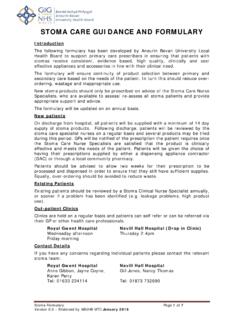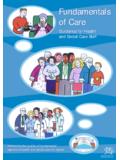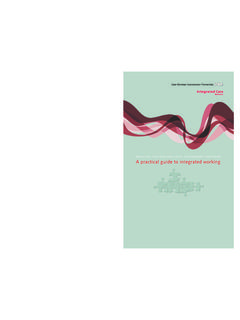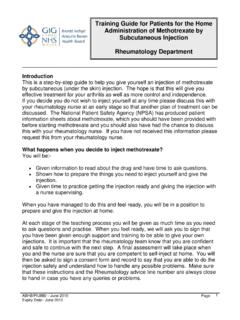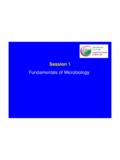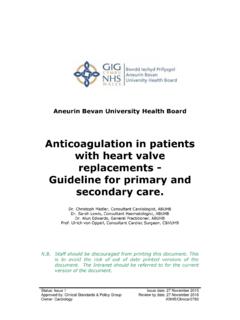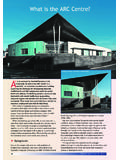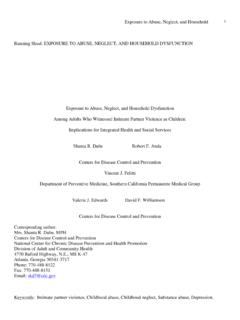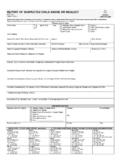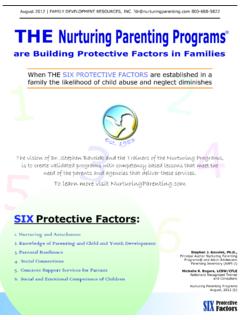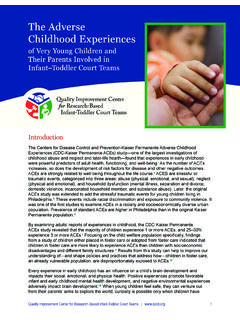Transcription of Adverse childhood experiences (ACEs) and …
1 Adverse childhood experiences ( aces ) and resilience :risk and protective factors for mental illnessthroughout lifeParentalseparation25%Domesticviolenc e17%Mentalillness18%Alcohol abuse13%Drug abuse6%Incarceration4%Household ACEsChild maltreatmentVerbalabuse20%Physical abuse16%Sexualabuse7%Emotional neglect7%Physical neglect4%Neglect was measured for the first time in 2017. Most people who reported neglect had multiple every 100 adults in Wales, 50 had at least one ACE and 14 had four or moreACEs substantially increased risks of mental illness1 in 3 adults reported having ever been treated for a mental illnesstimes more likely to currently be receiving treatment for mental illnesstimes more likely to have ever received treatment for mental illnesstimes more likely to have ever felt suicidal or self-harmedHow many adults reported each ACE in 2017?
2 Compared with people with no aces , those with four or more is the ability to overcome serious hardship. factors that support resilience include personal skills, positive relationships, community support and cultural connections. The Welsh ACE and resilience Survey asked adults about a range of such resilience resources as children and adults, their exposure to 11 aces and their physical and mental aces 50%1 ACE 19%2-3 aces 17%4+ aces 14%Adult resilience resources childhood resilience was associated withless mental illness across the life course in those both with and without ACEsPercenta ever treated for a mental illnessPercenta having ever feltsuicidal or self-harmedHaving some resilience resources more than halved risks of current mental illness in those with 4+ ACEsThe Welsh Adverse childhood experience (ACE)
3 and resilience Study interviewed approximately 2,500 adults (aged 18-69 years) across Wales in 2017. We are grateful to all those who voluntarily gave their time to participate. The information in this infographic is taken from Sources of resilience and their moderating relationships with harms from Adverse childhood experiences : Report 1 - Mental , Research and International Development Directorate, Public Health Wales, Clwydian House, Wrexham Technology Park, Wrexham, LL13 7YP. to sample demographics; bOverall resilience was measured using child and adult scales including personal, relationship, community and cultural resilience factors .
4 CRegular participation in community groups or social clubsNo25%0 ACEs4+ ACEs0 ACEs4+ ACEsHigh childhoodresilienceb14%4%11%17%39%25%41% 60%Low childhoodresiliencebChildhood resilience resources childhood resiliencebAdult resiliencebLow29%High14%Low37%High13%Nev er 28%Always19%Trusted adult relationshipRegular sports participationYes19%Perceived financial security5+ years11%<1 month35%Community engagementcNo23%Yes11%Those withmore aces hadfewer resilienceresources aschildren andadults Percent with current mental illnessPercent with current mental illness
